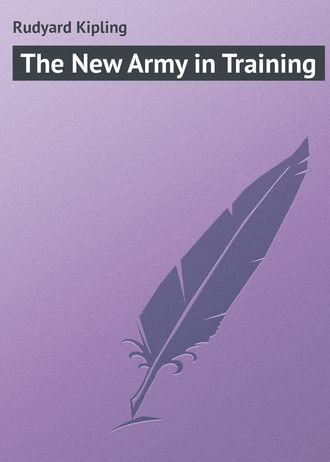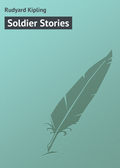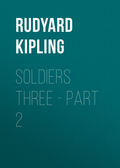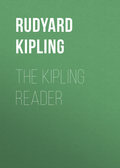
Редьярд Джозеф Киплинг
The New Army in Training
‘THE HUMOUR OF IT’
We entered what had been the local garage. The mechanical transport were in full possession, tinkering the gizzards of more cars. We discussed chewed-up gears (samples to hand), and the civil population’s old-time views of the military. The corporal told a tale of a clergyman in a Midland town who, only a year ago, on the occasion of some manœuvres, preached a sermon warning his flock to guard their womenfolk against the soldiers.
‘And when you think – when you know,’ said the corporal, ‘what life in those little towns really is!’ He whistled.
‘See that old landau,’ said he, opening the door of an ancient wreck jammed against a wall. ‘That’s two of our chaps’ dressing-room. They don’t care to be billeted, so they sleep ‘tween the landau and the wall. It’s handier for their work, too. Work comes in at all hours. I wish I was cavalry. There’s some use in cursing a horse.’
Truly, it’s an awful thing to belong to a service where speech brings no alleviation.
‘You!’ A private with callipers turned from the bench by the window. ‘You’d die outside of a garage. But what you said about civilians and soldiers is all out of date now.’
The sergeant of Regulars permitted himself a small, hidden smile. The private with the callipers had been some twelve weeks a soldier.
‘I don’t say it isn’t,’ said the corporal ‘I’m saying what it used to be.’
‘We-ell,’ the private screwed up the callipers, ‘didn’t you feel a little bit that way yourself – when you were a civilian?’
‘I – I don’t think I did.’ The corporal was taken aback. ‘I don’t think I ever thought about it.’
‘Ah! There you are!’ said the private, very drily.
Some one laughed in the shadow of the landau dressing-room. ‘Anyhow, we’re all in it now, Private Percy,’ said a voice.
There must be a good many thousand conversations of this kind being held all over England nowadays. Our breed does not warble much about patriotism or Fatherland, but it has a wonderful sense of justice, even when its own shortcomings are concerned.
We went over to the drill-shed to see the men paid.
The first man I ran across there was a sergeant who had served in the Mounted Infantry in the South African picnic that we used to call a war. He had been a private chauffeur for some years – long enough to catch the professional look, but was joyously reverting to service type again.
The men lined up, were called out, saluted emphatically at the pay-table, and fell back with their emoluments. They smiled at each other.
‘An’ it’s all so funny,’ murmured the master builder in my ear. ‘About a quarter – no, less than a quarter – of what one ‘ud be making on one’s own!’
‘Fifty bob a week, cottage, and all found, I was. An’ only two cars to look after,’ said a voice behind. ‘An’ if I’d been asked – simply asked– to lie down in the mud all the afternoon – !’ The speaker looked at his wages with awe. Some one wanted to know, sotto voce, if ‘that was union rates,’ and the grin spread among the uniformed experts. The joke, you will observe, lay in situations thrown up, businesses abandoned, and pleasant prospects cut short at the nod of duty.
‘Thank Heaven!’ said one of them at last, ‘it’s too dark to work on those blessed Bulfords any more to-day. We’ll get ready for the concert.’
But it was not too dark, half an hour later, for my car to meet a big lorry storming back in the wind and the wet from the northern camps. She gave me London allowance – half one inch between hub and hub – swung her corner like a Brooklands professional, changed gear for the uphill with a sweet click, and charged away. For aught I knew, she was driven by an ex-‘fifty-bob-a-week-a-cottage-and-all-found-‘er, who next month might be dodging shells with her and thinking it ‘all so funny.’
Horse, Foot, even the Guns may sometimes get a little rest, but so long as men eat thrice a day there is no rest for the Army Service Corps. They carry the campaign on their all-sustaining backs.
IV
CANADIANS IN CAMP
Before you hit the buffalo, find out where the rest of the herd is. —Proverb.
This particular fold of downs behind Salisbury might have been a hump of prairie near Winnipeg. The team that came over the rise, widely spaced between pole-bar and whiffletrees, were certainly children of the prairie. They shied at the car. Their driver asked them dispassionately what they thought they were doing, anyway. They put their wise heads together, and did nothing at all. Yes. Oh, yes! said the driver. They were Western horses. They weighed better than twelve hundred apiece. He himself was from Edmonton way. The Camp? Why, the camp was right ahead along up this road. No chance to miss it, and, ‘Sa-ay! Look out for our lorries!’
A fleet of them hove in sight going at the rate of knots, and keeping their left with a conscientiousness only learned when you come out of a country where nearly all the Provinces (except British Columbia) keep to the right. Every line of them, from steering-wheel to brake-shoes, proclaimed their nationality. Three perfectly efficient young men who were sprinkling a golf-green with sifted earth ceased their duties to stare at them. Two riding-boys (also efficient) on racehorses, their knees under their chins and their saddles between their horses’ ears, cantered past on the turf. The rattle of the motors upset their catsmeat, so one could compare their style of riding with that of an officer loping along to overtake a string of buck-wagons that were trotting towards the horizon. The riding-boys have to endure sore hardship nowadays. One gentleman has already complained that his ‘private gallops’ are being cut up by gun-wheels and ‘irremediably ruined.’
Then more lorries, contractors’ wagons, and increasing vileness of the battered road-bed, till one slid through a rude gate into a new world, of canvas as far as the eye could reach, and beyond that outlying clouds of tents. It is not a contingent that Canada has sent, but an army – horse, foot, guns, engineers, and all details, fully equipped. Taking that army’s strength at thirty-three thousand, and the Dominion’s population at eight million, the camp is Canada on the scale of one to two hundred and forty – an entire nation unrolled across a few square miles of turf and tents and huts.
Here I could study at close hand ‘a Colony’ yearning to shake off ‘the British yoke.’ For, beyond question, they yearned – the rank and file unreservedly, the officers with more restraint but equal fervour – and the things they said about the Yoke were simply lamentable.
From Nova Scotia to Victoria, and every city, township, distributing-centre, and divisional point between; from sub-tropical White River and sultry Jackfish to the ultimate north that lies up beside Alaska; from Kootenay, and Nelson of the fruit-farms, to Prince Edward Island, where motors are not allowed; they yearned to shake it off, with the dust of England from their feet, ‘at once and some time before that.’
I had been warned that when Armageddon came the ‘Colonies’ would ‘revolt against the Mother Country as one man’; but I had no notion I should ever see the dread spectacle with my own eyes – or the ‘one man’ so tall!
Joking apart, the Canadian Army wants to get to work. It admits that London is ‘some city,’ but says it did not take the trip to visit London only. Armageddon, which so many people in Europe knew was bound to come, has struck Canada out of the blue, like a noonday murder in a small town. How will they feel when they actually view some of the destruction in France, these men who are used to making and owning their homes? And what effect will it have on their land’s outlook and development for the next few generations? Older countries may possibly slip back into some sort of toleration. New peoples, in their first serious war, like girls in their first real love-affair, neither forget nor forgive. That is why it pays to keep friends with the young.
And such young! They ran inches above all normal standards, not in a few companies or battalions, but through the whole corps; and it was not easy to pick out foolish or even dull faces among them. Details going about their business through the camp’s much mud; defaulters on fatigue; orderlies, foot and mounted; the procession of lorry-drivers; companies falling in for inspection; battalions parading; brigades moving off for manœuvres; batteries clanking in from the ranges; they were all supple, free, and intelligent; and moved with a lift and a drive that made one sing for joy.
CAMP GOSSIP
Only a few months ago that entire collection poured into Valcartier camp in pink shirts and straw hats, desperately afraid they might not be in time. Since then they have been taught several things. Notably, that the more independent the individual soldier, the more does he need forethought and endless care when he is in bulk.
‘Just because we were all used to looking after ourselves in civil life,’ said an officer, ‘we used to send parties out without rations. And the parties used to go, too! And we expected the boys to look after their own feet. But we’re wiser now.’
‘They’re learning the same thing in the New Army,’ I said. ‘Company officers have to be taught to be mothers and housekeepers and sanitary inspectors. Where do your men come from?’
‘Tell me some place that they don’t come from,’ said he, and I could not. The men had rolled up from everywhere between the Arctic circle and the border, and I was told that those who could not get into the first contingent were moving heaven and earth and local politicians to get into the second.
‘There’s some use in politics now,’ that officer reflected. ‘But it’s going to thin the voting-lists at home.’
A good many of the old South African crowd (the rest are coming) were present and awfully correct. Men last met as privates between De Aar and Belmont were captains and majors now, while one lad who, to the best of his ability, had painted Cape Town pink in those fresh years, was a grim non-commissioned officer worth his disciplined weight in dollars.
‘I didn’t remind Dan of old times when he turned up at Valcartier disguised as a respectable citizen,’ said my informant. ‘I just roped him in for my crowd. He’s a father to ‘em. He knows.’
‘And have you many cheery souls coming on?’ I asked.
‘Not many; but it’s always the same with a first contingent. You take everything that offers and weed the bravoes out later.’
‘We don’t weed,’ said an officer of artillery. ‘Any one who has had his passage paid for by the Canadian Government stays with us till he eats out of our hand. And he does. They make the best men in the long run,’ he added. I thought of a friend of mine who is now disabusing two or three ‘old soldiers’ in a Service corps of the idea that they can run the battalion, and I laughed. The Gunner was right. ‘Old soldiers,’ after a little loving care, become valuable and virtuous.
A company of Foot was drawn up under the lee of a fir plantation behind us. They were a miniature of their army as their army was of their people, and one could feel the impact of strong personality almost like a blow.
‘If you’d believe it,’ said a cavalryman, ‘we’re forbidden to cut into that little wood-lot, yonder! Not one stick of it may we have! We could make shelters for our horses in a day out of that stuff.’
‘But it’s timber!’ I gasped. ‘Sacred, tame trees!’
‘Oh, we know what wood is! They issue it to us by the pound. Wood to burn – by the pound! What’s wood for, anyway?’
‘And when do you think we shall be allowed to go?’ some one asked, not for the first time.
‘By and by,’ said I. ‘And then you’ll have to detail half your army to see that your equipment isn’t stolen from you.’
‘What!’ cried an old Strathcona Horse. He looked anxiously towards the horse-lines.
‘I was thinking of your mechanical transport and your travelling workshops and a few other things that you’ve got.’
I got away from those large men on their windy hill-top, and slid through mud and past mechanical transport and troops untold towards Lark Hill. On the way I passed three fresh-cut pine sticks, laid and notched one atop of the other to shore up a caving bank. Trust a Canadian or a beaver within gunshot of standing timber!






